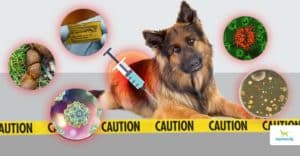Being sick sucks. If your dog has kennel cough, you’re here to find remedies that work fast! So if your dog’s coughing, scroll down to the second part of this post to find natural herbal and homeopathic kennel cough remedies.
But it’s also important to know more about kennel cough and how it affects your dog. Here’s what’s in this article.
- What Is Kennel Cough?
- What Causes Kennel Cough?
- Does The Kennel Cough Vaccine Prevent Kennel Cough?
- What Are The Symptoms Of Kennel Cough?
- How To Prevent Kennel Cough Naturally
- Homeopathic Remedies For Kennel Cough
What Is Kennel Cough?
Kennel cough is an infectious bronchitis your dog can catch from other dogs. He can also pick it up from the environment if a sick dog has been around recently. Kennel cough is the dog version of the human common cold. So … even though that hacking cough can sound nasty, it’s not usually serious.
Like a cold, it’s normally a self-limiting disease. That means your dog will get over it on his own in time. But even so, it’s better to avoid it altogether! So, knowing how to prevent and treat kennel cough really helps. Especially if your dog travels … or is the sociable type who romps at the park with other dog friends.
What Causes Kennel Cough?
It’s not surprising that kennel cough has a few other names. It can stem from several infections coming together at the same time. Depending on your dog’s symptoms, your vet may use one name more than another.
The main cause of kennel cough is a weakened immune system. When your dog’s natural defenses are down, his body is more prone to infection. Kennel cough can often happen when two or more bacteria or viruses attack your dog’s immune system at once.
There’s a lot of research to try and pinpoint the causes of infection. The more studies they do … the more viruses and bacteria they find in kennel cough infections.
The most frequent culprit in dogs with kennel cough is Bordetella bronchiseptica. But there’s a long list of other sidekicks that also cause this mixed infection, including
- Canine parainfluenza virus(CAV-2)
- Canine influenza virus (CIV)
- Streptococcus equi subspecies zooepidemicus
- Canine adenovirus-2 (CAV-2)
- Canine distemper virus (CDV)
- Mycoplasma species
- Canine respiratory coronavirus (CRCoV)
- Canine pneumovirus (CnPnV)
So you can see that it’s tough to know just what bacteria or virus sick dogs are sharing. But it doesn’t really matter … because you can spot the symptoms early to help control kennel cough before it spreads.
What Are The Symptoms Of Kennel Cough?
Kennel cough often sounds like a harsh, hacking cough … a bit like a cat coughing up a hairball. Your dog may only cough occasionally, or when he’s excited. These aren’t the only signs, though. Other possible symptoms include:
- Sounding like something’s stuck in his throat
- Less interest in his food
- Runny nose
- Low energy or less interested in his usual activities
- And in more severe cases, a fever
There’s more detail about treatment later. But with mild kennel cough, the main goal is to boost your dog’s immune system. That’ll help him get over it it faster … and prevent it from worsening. Severe kennel cough can cause a fever … and could even turn into pneumonia. Pneumonia can be painful and difficult to treat.
If your dog has any other diseases or auto-immune health issues like the ones listed below, he’ll be more likely to pick up an infection and develop kennel cough.
- Leaky gut
- Thyroid disease
- Allergies
- Kidney disease
- Liver disease
- Cancer
So, you’ll want to prevent kennel cough if you can. But what’s the best way to do that? Most people you ask will recommend vaccination. But how effective is that?
Does The Kennel Cough Vaccine Prevent Kennel Cough?
Chances are … your dog’s daycare, trainer or boarding facility asks for proof of kennel cough (also known as Bordetella) vaccination …
… but should you really be vaccinating your dog for kennel cough? And does the kennel cough vaccine really work?
These facilities want all dogs vaccinated before they hang out together. That’s because the risk of kennel cough infection is higher when dogs mingle. Just like when the kids first go back to school and share all their new germs with each other.
But before you give your dog any vaccine, you should ask these questions:
- Is the vaccine safe?
- Is the vaccine effective?
- Lastly, is the disease dangerous?
So let’s review these questions and find out if the kennel cough vaccine is really the best choice for your dog.
Is The Kennel Cough Vaccine Safe?
Most vaccines these days are modified live vaccines. That means they bring risks for your dog. Modified live vaccines contain bacteria or viruses that have been altered … so that they don’t cause clinical disease. But they do stimulate the immune response.
The problem is … modified live vaccines can also cause the disease they were meant to prevent. And research in humans shows they can embed themselves in the genes of the host. This happens with dogs too. It means the viruses can stay in your dog’s body, then cause illness later … sometimes even years later.
Veterinarian Patricia Jordan DVM also reminds us that vaccination of any sort elevates histamines. When histamine levels are high they cause chronic inflammation. Chronic inflammation can trigger other diseases (including cancer) as your dog ages.
And do you know why your daycare or boarding facility asks you to vaccinate your dog at least a couple weeks before he visits? It’s because your dog can shed the live bacteria and virus for a up to 7 weeks after vaccination …
… So other dogs can catch kennel cough from your vaccinated dog … even though your dog doesn’t have the cough.
Is The Kennel Cough Vaccine Effective?
Unfortunately, the kennel cough vaccine is not very effective. It’s the reason we don’t have cold vaccines for people! It’s also why vets recommend vaccinating for kennel cough 2 or 3 times a year.
I mentioned earlier that kennel cough infections come from a mix of bacteria and viruses. But not all of these agents are included in the vaccines. There are about 40 agents that cause kennel cough … but the vaccine only covers a few of them. And if the vaccine did include all of them …. it would make it even riskier.
Your dog’s immune system isn’t built to handle so many stressors at once.
So the vaccine makers had to choose the most common infection triggers and use those for vaccines. Some cause more harm than good. Currently most vets consider the intranasal kennel cough vaccines to be the most effective. But the problem goes back to that mixed infection aspect of kennel cough. The intranasal vaccines only contain canine parainfluenza and Bordetella bronchiseptica.
This means the vaccine is ineffective. Here’s what immunologist Ronald Schultz PhD said:
“Many animals receive “kennel cough” vaccines that include Bordetella and CPI and/or CAV-2 every 6 to 9 months without evidence that this frequency of vaccination is necessary or beneficial” “In contrast, other dogs are never vaccinated for kennel cough and disease is not seen.
“CPI immunity lasts at least 3 years when given intranasally, and CAV -2 immunity lasts a minimum of 7 years parenterally for CAV-I” says Schultz.
“These two viruses in combination with Bordetella bronchiseptica are the agents most often associated with kennel cough, however, other factors play an important role in disease (eg stress, dust, humidity, molds, mycoplasma, etc), thus kennel cough is not a vaccine preventable disease because of the complex factors associated with this disease.
“Furthermore, this is often a mild to moderate self limiting disease. I refer to it as the ‘Canine Cold.’” concludes Schultz.
So … is vaccinating your dog worth the risk, with so little benefit? And that takes us to the last question.
Is Kennel Cough So Dangerous That We Need To Vaccinate?
You now know that it’s the dog equivalent of a cold. It poses some extra risk to immune-compromised dogs. But it’s not life threatening if you support your dog’s immune system. There are ways to prevent and treat kennel cough naturally. So it’s a good idea to say no to the vaccine.
Here’s a more natural, safer approach to preventing kennel cough.
How To Prevent Kennel Cough Naturally
Here are two safe and effective ways to help prevent kennel cough in your dog …
Medicinal Mushrooms
There are several medicinal mushrooms with immune-boosting properties that you can feed your dog. They’ll support his immune health … and research shows that they offer many health benefits, including:
- Antioxidant support to fight cell damage and disease
- Prebiotic support for gut health
- Cancer prevention
What’s great is that each mushroom offers a unique range of benefits. So you’ll want to feed a combination of medicinal mushrooms to boost your dog’s overall health. The major medicinal mushrooms with good medical research behind them are:
Reishi
Antiviral, antibacterial and anti-tumor; protects the liver and heart
Turkey Tail
Powerful immune support; helps fight cancer and pulmonary disorders .
Shiitake
Soothes bronchial inflammation; helps the body detox.
Phellinus
Anti-inflammatory, antibacterial, anti-cancer; stimulates cell mediated immunity.
Chaga
Antiviral, anti-inflammatory; high in antioxidants.
Cordyceps
Antifungal, antibacterial; supports gut, liver, heart and lung health.
RELATED: The benefits of mushrooms for dogs
Nosodes
Nosodes are specialized homeopathic remedies for prevention of disease.
Most homeopathic remedies are made from plants or minerals. But nosodes come from diseased tissue from a sick animal.They’re diluted thousands of times to create a bioenergetic remedy … that can interact with the body’s energy field. Nosodes are an energetic blueprint of the actual disease … but they don’t contain any toxins or chemicals. This makes them a really safe alternative to vaccination.
A Proven Way To Prevent Disease
Dr Isaac Golden, an Australian homeopath, has done extensive research into homeopathic childhood immunizations. In a clinical trial of typical childhood diseases, Dr Golden concluded that homeopathic immunizations were 90.4% effective.
Dr Christopher Day, a British veterinary homeopath, has used nosodes in his practice for 35 years. In 1985, Dr Day documented the successful use of nosodes in a kennel cough outbreak. The trial was done in a daycare with 214 dogs, both vaccinated and unvaccinated. The nosodes were given in the dogs’ drinking water.
Out of 214 dogs who got the kennel cough nosode, only 1.9% caught the full-blown disease. Most dogs who did get kennel cough had only minor symptoms. But the vaccinated dogs had worse results. 4.7% of them got kennel cough, compared to only 0.7% of the unvaccinated ones.
So nosodes can be highly effective in preventing kennel cough. And when dogs do get sick, nosodes can reduce the severity of symptoms.
RELATED: Can nosodes replace vaccines?
Herbs For Kennel Cough
Adding some herbs and spices into your dog’s food can support his immune system to help prevent illness. Consider feeding some of these daily … especially when he might be be stressed from something like traveling or meeting new dogs. The change of seasons can also weaken your dog’s defenses – just like ours!
Top Immune Boosting Herbs For Your Dog
Echinacea
Echinacea is a useful immune stimulant. It’s great at fighting off illness due to changes in seasonal temperatures … and can prevent infectious diseases like kennel cough. Echinacea is most effective as a preventive. Once your dog has symptoms, echinacea won’t treat the illness.
Its immune-boosting abilities come from the components echinacoside and echinacein.nThey support his immune system by:
- Providing natural antibiotic and anti-fungal properties
- Offering anti-viral support
As an additional benefit, research shows echinacea can also help prevent the growth of cancer cells by extending the life of healthy cells.
How Much To Give: For most dogs, give 12 to 25 drops of echinacea tincture three times a day. Low alcohol glycerin extracts are best. Give 5 days on, 2 to 3 days off for best effect.
Garlic
Yes, garlic. There’s a lot of misunderstanding about garlic … and many people believe it’s harmful to dogs. But it’s actually good for your dog. And it’s one of the best foods for immune health. Garlic contains antioxidants like vitamin A … and minerals like sulfur and zinc. It also provides a wide range of B vitamins to support gut health.
Garlic also has powerful antiviral, antibacterial, anti-inflammatory and anti-cancer abilities. In fact, even people chew whole cloves of raw garlic to get rid of colds.
How To Feed Your Dog Garlic:
- Use fresh, organic garlic.
- Peel the cloves then mince, chop or crush the garlic. Let it sit 10 to 15 minutes. This releases garlic’s main medicinal property, allicin.
- Allicin degrades quickly, so use the garlic immediately after the “sitting” period.
- Mix it into your dog’s food.
How Much Garlic To Give:
Give the amount below, according to your dog’s weight:
- 5lbs: 1/6 tsp
- 10lbs: 1/3 tsp
- 15 lbs: 1/2 tsp
- 20lbs: 2/3 tsp
- 30 lbs: 1 tsp
RELATED: Learn about other health benefits of garlic for your dog …
Rose Hips
Rose hips offer your dog a great natural source of vitamin C that his body can easily process. They’re much better than synthetic vitamin C supplements (like ascorbic acid), which can cause diarrhea … defeating the goal of making him healthier.
How Much To Give: Add 1/2 to 1 tsp of ground rose hips per cup of food.
Ginger
Ginger is a warming, drying and tonifying herb. It stimulates the immune system and has strong antiviral, anti-inflammatory, antibacterial properties.
Buy ginger in root form (at most grocery stores). Peel off the skin and finely mince the yellow part of the root. Add to food in the amounts below.
How Much Ginger To Feed:
- 1/4 tsp for miniature breeds.
- 1/2 teaspoon for dogs under 35 pounds
- 3/4 teaspoon for larger dogs
RELATED: Learn more about ginger …
Chamomile
You likely think of chamomile for supporting anxiety or digestive issues, due to its calming and stomach-soothing effects. But it also has strong anti-inflammatory and antimicrobial properties to boost your dog’s immune system.
Because chamomile is a mild tonic, it’s safe to feed to your dog if he has a sensitive stomach or any liver issues.
How Much To Give:
In glycerin tincture form, give 0.25 ml to 0.50 ml per 20 lbs of body weight twice daily, placed in your dog’s mouth or added to water.
BONUS: Simple Immune Boosting Herbal Formula Recipe
This herbal immune boosting recipe is safe for all dogs including seniors and puppies 10 weeks and older.
You can use this herbal blend when you feel your dog needs an extra immune boost.
- 4 Tbsp ground rose hips
- 4 Tbsp dried echinacea
- 1 to 2 teaspoons of fresh ginger, or more, if your dog tolerates its strong taste
- 4 Tbsp dried chamomile
- Mix all the herbs thoroughly in a glass jar
- Close the jar tightly and store in a dry place away from direct sunlight
Dosing For Herbal Immune Blend & Garlic
- Small dogs under 30 lbs: feed 1/4 a freshly minced garlic clove + 3/4 tsp of the herb blend twice a day
- Medium sized dogs 30 to 50 lbs: feed 1/2 a freshly minced garlic clove + ½ Tbsp of the herbal blend twice per day day
- For large and giant dogs 50 lbs+: feed 1 freshly minced garlic clove and 1 tbsp of the herb blend twice a day
Or, for an even greater benefit, you can infuse the herbs to make a tea. Simply pour hot water over your dog’s dose and let it steep for about 10 minutes. Then add the whole mixture to your dog’s meal. This will give your dog a nice warm meal as well.
Homeopathic Remedies For Kennel Cough
If your dog already has kennel cough these remedies will help you get him back on his paws quickly. Pick the remedy that best fits your dog’s symptoms. If he doesn’t improve after a few doses, move on to the next best remedy.
Drosera – This is the primary remedy for kennel cough. Use it for a dry, hacking cough that may be worse when your dog lies down.
Bryonia alba – If your dog’s breathing seems abdominal and the cough is deeper, Bryonia may fit the bill … especially if coughing seems painful. Test this by putting your hand on his rib cage when he’s coughing. If he seems better with support he’s got some pain. He’ll also likely want to rest more … as exercise and motion will trigger his cough.
Phosphorus – Another remedy for a dry, hacking cough that’s worse in when he’s exposed to cold air. Phosphorus is also good if you see small flecks of blood or blood-tinged mucus. He’ll appear chilly, thirsty and unusually hungry.
Spongia tosta – This remedy is good for a very dry, barking cough. It may be accompanied by a weak heart. Warm water will generally improve his cough … and cold water will aggravate it.
Aconitum napellus (Aconite) – The key to this remedy is sudden onset. So it’s most effective when symptoms first appear. If given early, Aconite can prevent the kennel cough entirely. Your dog may appear nervous and fearful. Aconite will help to calm him, especially in the evening hours.
Rumex crispus – This remedy is associated with an abundance of mucus accompanied by a persistent cough that frequently changes characteristics. Symptoms will generally be better in the evening or night, and worse in cold air.
Ipecacuanha – This remedy is good for coughing that produces vomiting. The cough is often worse at night and worse with cold air. The vomit or mucus may be blood-tinged. Breathing will be labored and he may seem to be wheezing.
Coccus cacti – Good for when the cough is worse at night and breathing is difficult. Coughing fits can last for several minutes, but there may be long periods of relief.
Bromium – This remedy helps when mucus makes drawing in a breath difficult. You’ll hear rattling in his chest and the cough will be wheezing and rough.
Carbo vegetabilis – This remedy usually gives immediate relief to dogs who have acute difficulty breathing at night. He’ll want to seek cool, open air. Although the cough is normally worse in the evening, the morning cough produces a greenish-yellow mucus. Carbo veg is a valuable remedy for dogs who are weak and cold and often in the later stages of illness.
Hepar sulphuris calcareum – This remedy is helpful when there’s great sensitivity to wind and cold air, which can make the cough worse. Cold food and drinks make things worse as well. He’ll have a loose-sounding barking cough with mucus.
*Hepar sulph is usually reserved for more chronic treatment.
Causticum – The Causticum dog is better with cold water and has a hoarse, hollow cough. There may be discharge of urine in an older patient when coughing.The Causticum patient generally has a lot of weakness going on.
How to Give Remedies For Kennel Cough Support
- Use a 30C potency … or whatever potency you have on hand.
- Choose the remedy that best matches your dog’s current symptoms.
- Try not to touch the pellets with your hands – it can negate the remedy.
- For any size dog, place 3 pellets in a glass of filtered or spring water (never use unfiltered tap water).
- Stir vigorously with a spoon.
- Place a few drops on your dog’s gums using a dropper or teaspoon.
- Give the remedy about 20 minutes away from food if you can.
- The remedy will keep for a few days on the counter. Don’t refrigerate it.
- Stir vigorously again before each dose.
- Give 2 or 3 doses in the first hour.
- If you see any improvement after giving the remedy, the remedy is working. Should your dog continues to improve, then there’s no need to re-dose.
- If you see improvement but then symptoms return, dose again once.
- If there’s no change within a few hours, then try the next best-fitting remedy.
References
Guggenheim AG, Wright KM, Zwickey HL. Immune Modulation From Five Major Mushrooms: Application to Integrative Oncology. Integr Med (Encinitas). 2014;13(1):32-44.
Miller SC. Echinacea: a miracle herb against aging and cancer? Evidence in vivo in mice. Evid Based Complement Alternat Med. 2005;2(3):309-314. doi:10.1093/ecam/neh118















